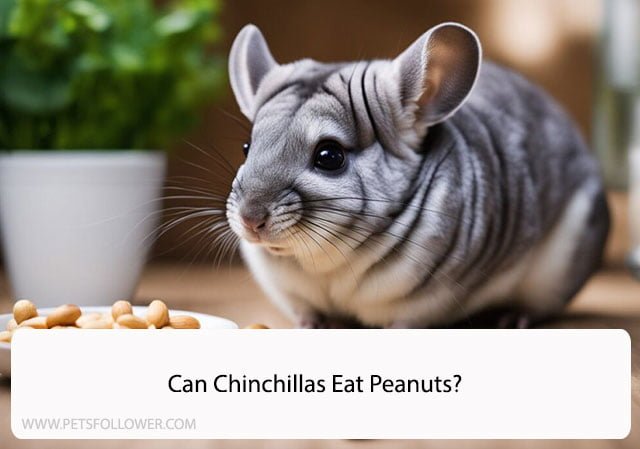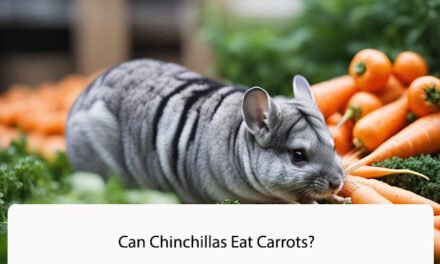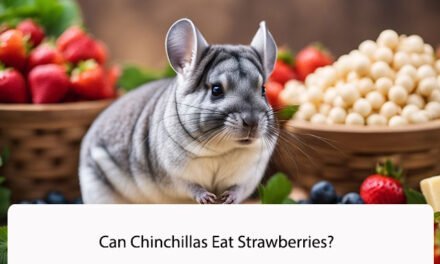Chinchillas are adorable little creatures that make great pets. However, as with any pet, it’s important to know what they can and cannot eat. One common question that chinchilla owners have is whether or not their furry friend can eat peanuts.
The answer is no, chinchillas should not eat peanuts. While peanuts are a popular snack for humans, they are not a suitable food for chinchillas. Peanuts are high in fat and can be difficult for chinchillas to digest, which can lead to health problems.
It’s important for chinchilla owners to be aware of what their pets can and cannot eat. While it may be tempting to share your snacks with your furry friend, it’s important to stick to their specific dietary needs to ensure their health and happiness.
Can Chinchillas Eat Peanuts?

As chinchilla owners, we want to give our furry friends the best possible diet. When it comes to feeding chinchillas, it’s important to know what foods are safe and what foods are not. One food that often comes up in discussions about chinchilla diets is peanuts. So, can chinchillas eat peanuts?
The short answer is no, chinchillas should not eat peanuts. Peanuts are high in fat and protein, which can be harmful to chinchillas. Chinchillas have sensitive digestive systems and are prone to digestive problems, so it’s important to feed them a diet that is low in fat and high in fiber.
In addition to being high in fat and protein, peanuts also contain aflatoxins, which are toxic substances produced by certain types of fungi. Aflatoxins can cause liver damage and other health problems in animals, including chinchillas.
While peanuts are not a good choice for chinchillas, there are plenty of other foods that are safe and healthy for them to eat. Some good options include hay, fresh vegetables, and chinchilla pellets. It’s important to provide your chinchilla with a balanced diet that meets all of their nutritional needs.
In summary, chinchillas should not eat peanuts due to their high fat and protein content, as well as the presence of toxic aflatoxins. As responsible chinchilla owners, we should always do our research and provide our pets with a healthy diet that promotes their overall well-being.
Understanding Chinchilla Diet
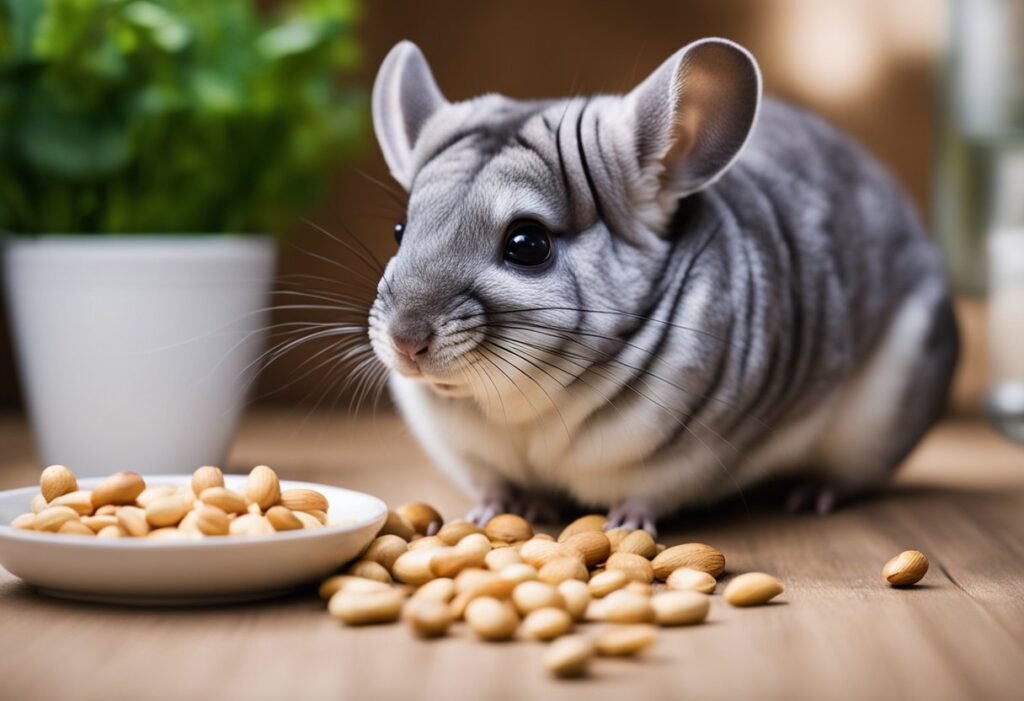
When it comes to chinchilla diet, it’s important to understand that these small animals have very specific nutritional needs. As herbivores, chinchillas require a diet that is high in fiber and low in fat. This means that they should primarily be consuming hay and pellets.
Hay is an essential component of a chinchilla’s diet as it provides the necessary fiber to keep their digestive system healthy. Timothy hay is the most commonly recommended type of hay for chinchillas as it is low in calcium and high in fiber.
Pellets are another important part of a chinchilla’s diet as they provide essential vitamins and minerals. However, it’s important to choose a high-quality pellet that is specifically formulated for chinchillas and does not contain any unnecessary additives or fillers.
While chinchillas may enjoy a variety of fruits and vegetables as treats, it’s important to limit their intake as these foods are high in sugar and can upset their delicate digestive system. In addition, chinchillas should never be given nuts or seeds as they are high in fat and can cause digestive issues.
Overall, understanding the specific nutritional needs of chinchillas is essential for their health and wellbeing. By providing them with a diet that is high in fiber and low in fat, we can help ensure that they live a long and healthy life.
Potential Risks of Feeding Peanuts to Chinchillas
Feeding peanuts to chinchillas can pose several potential risks that should be considered before offering them as a treat.
Firstly, peanuts are high in fat and protein, which is not suitable for chinchillas. Chinchillas require a low-fat and high-fiber diet, and feeding them peanuts can lead to obesity and other health issues.
Secondly, peanuts can be contaminated with aflatoxins, which are toxic substances produced by certain types of fungi. Aflatoxins can cause liver damage and cancer in chinchillas, and even small amounts of contaminated peanuts can be harmful.
Lastly, chinchillas have sensitive digestive systems and feeding them peanuts can cause digestive problems such as diarrhea and bloating. The high fat content of peanuts can also cause pancreatitis, a condition where the pancreas becomes inflamed and can lead to serious health problems.
In summary, feeding peanuts to chinchillas can pose several potential risks, and it is best to avoid them altogether. Instead, chinchillas should be fed a diet that consists of hay, pellets, and fresh vegetables to ensure they receive all the necessary nutrients for a healthy life.
Safe Foods for Chinchillas
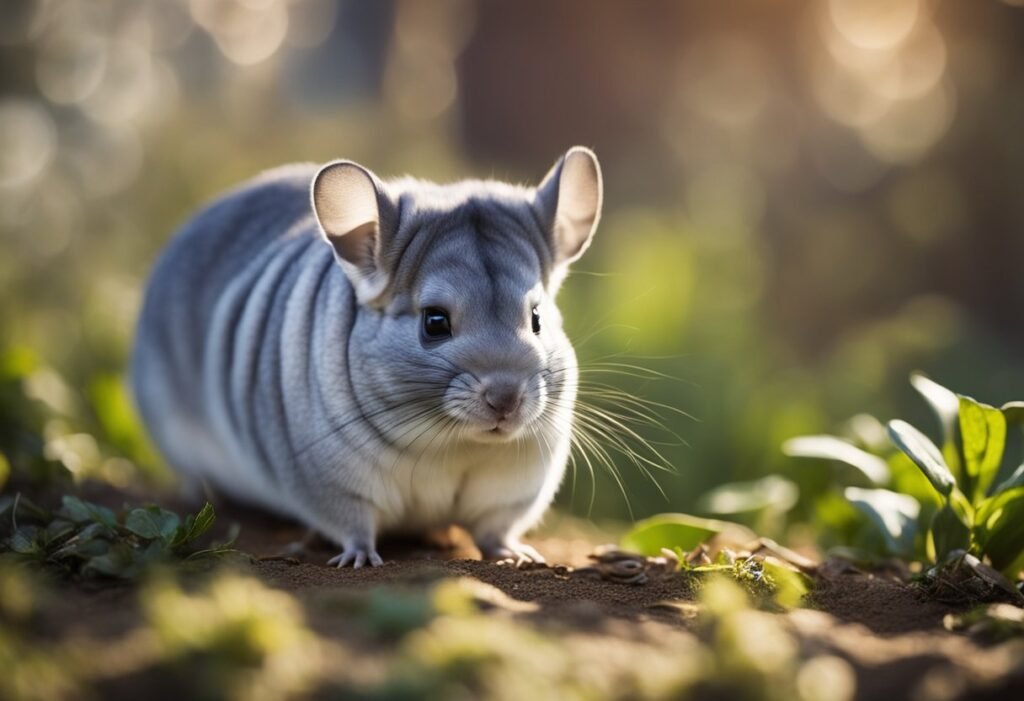
As chinchilla owners, we want to make sure that our furry friends are getting the best nutrition possible. While chinchillas have a delicate digestive system that requires a specific diet, there are many safe foods that we can offer them to keep them healthy and happy.
Here are some safe foods that chinchillas can eat:
- Hay: Timothy hay is an essential part of a chinchilla’s diet. It provides them with the fiber they need to maintain a healthy digestive system and keep their teeth from overgrowing.
- Pellets: High-quality chinchilla pellets should be the main component of your chinchilla’s diet. They are specially formulated to provide the nutrients that chinchillas need.
- Fresh Vegetables: Chinchillas can eat a variety of fresh vegetables, including carrots, broccoli, and kale. However, it’s important to introduce new vegetables slowly and in small quantities to avoid upsetting their stomachs.
- Fresh Fruit: Chinchillas can also enjoy small amounts of fresh fruit, such as apples and bananas. However, fruit should be given sparingly due to its high sugar content.
- Treats: Chinchillas love treats, but it’s important to choose them carefully. Safe treats include rose hips, dried herbs, and small amounts of plain, unsalted nuts.
While peanuts are not toxic to chinchillas, they should be avoided due to their high fat content. Chinchillas are prone to obesity, and a diet high in fat can lead to health problems.
By offering our chinchillas a variety of safe foods, we can ensure that they are getting the nutrition they need to thrive.
Unsafe Foods for Chinchillas
As responsible chinchilla owners, we need to be mindful of what we feed our pets. While chinchillas have a varied diet, there are certain foods that are unsafe for them to consume. In this section, we will discuss some of the foods that should be avoided.
Peanuts
While peanuts are a popular snack for humans, they are not suitable for chinchillas. Peanuts are high in fat and can cause digestive problems for chinchillas. Additionally, peanuts can contain aflatoxin, a toxin produced by a type of fungus that grows on certain crops, including peanuts. Aflatoxin can be harmful to chinchillas and can cause liver damage.
Chocolate
Chocolate is another food that should be avoided when feeding chinchillas. Chocolate contains theobromine, a chemical that can be toxic to chinchillas. Theobromine can cause vomiting, diarrhea, and even death in severe cases.
Dairy Products
While chinchillas can consume some dairy products in small amounts, it is best to avoid feeding them to your pet altogether. Dairy products, such as cheese and milk, are high in fat and can cause digestive problems for chinchillas. Additionally, chinchillas are lactose intolerant and cannot digest lactose properly.
Sugary Foods
Sugary foods, such as candy and soda, should be avoided when feeding chinchillas. Chinchillas do not need sugar in their diet and consuming sugary foods can lead to dental problems, obesity, and other health issues. Instead, chinchillas should be fed a diet that is high in fiber and low in sugar.
In conclusion, it is important to be mindful of what we feed our chinchillas. While chinchillas have a varied diet, there are certain foods that should be avoided. By following a balanced diet that is high in fiber and low in fat and sugar, we can ensure that our chinchillas remain healthy and happy.
How to Introduce New Foods to Chinchillas
When introducing new foods to chinchillas, it is important to do so gradually. Chinchillas have sensitive digestive systems, and sudden changes in their diet can cause digestive upset. Here are some tips on how to introduce new foods to your chinchilla:
- Start with small amounts: When introducing a new food, start with a small amount and gradually increase the amount over a period of several days. This will give your chinchilla’s digestive system time to adjust to the new food.
- Monitor your chinchilla’s behavior: Watch your chinchilla closely after introducing a new food. If you notice any signs of digestive upset, such as diarrhea or a lack of appetite, stop feeding the new food and consult with your veterinarian.
- Offer a variety of foods: Chinchillas require a balanced diet that includes hay, pellets, and fresh vegetables. Offer a variety of vegetables to ensure that your chinchilla is getting all of the nutrients that they need.
- Avoid sugary or fatty foods: Chinchillas are prone to obesity and dental problems, so it is important to avoid sugary or fatty foods. This includes foods like peanuts, which are high in fat.
By following these tips, you can safely introduce new foods to your chinchilla’s diet and ensure that they are getting all of the nutrients that they need.
Signs of a Healthy Chinchilla Diet
A healthy chinchilla diet should consist of hay, pellets, and fresh water. Providing your chinchilla with a balanced diet is essential to their overall health and well-being. Here are some signs to look for to ensure that your chinchilla is getting the proper nutrition they need:
1. Good Dental Health
Chinchillas have open-rooted teeth that grow continuously throughout their lives. A healthy diet that includes hay and pellets helps wear down their teeth naturally, preventing overgrowth and other dental problems. If your chinchilla’s teeth are too long, they may have difficulty eating or develop other health issues.
2. Normal Digestion
Your chinchilla’s droppings should be small, firm, and dry. If their droppings are soft or runny, it may be a sign of digestive issues. A diet that is too high in fat or sugar can cause diarrhea and other digestive problems.
3. Healthy Coat
A healthy chinchilla diet should also promote a healthy coat. A diet that is high in fat and sugar can cause skin issues and a dull, rough coat. A diet that is rich in essential nutrients, such as vitamins and minerals, can help promote a healthy, shiny coat.
In conclusion, it is essential to provide your chinchilla with a healthy and balanced diet to ensure their overall health and well-being. By looking for these signs, you can ensure that your chinchilla is getting the proper nutrition they need.
What to Do If Your Chinchilla Eats Unsafe Foods
If you suspect that your chinchilla has eaten an unsafe food, it’s important to act quickly. Some foods can be toxic to chinchillas and cause serious health problems. Here’s what you should do:
- Remove the unsafe food immediately. If your chinchilla is still eating it, take it away as soon as possible.
- Monitor your chinchilla for any signs of illness. Watch for symptoms such as vomiting, diarrhea, lethargy, or loss of appetite.
- Contact your veterinarian. If you notice any signs of illness, it’s important to seek veterinary care right away. Your veterinarian can help determine if your chinchilla needs treatment and what steps you should take next.
- Provide plenty of fresh water. Encourage your chinchilla to drink plenty of water to help flush out any toxins.
- Stick to a safe diet. To prevent future incidents, make sure your chinchilla is only eating safe foods. Stick to a diet of hay, pellets, and fresh vegetables, and avoid giving your chinchilla any treats or human foods unless you’re sure they’re safe.
Remember, prevention is always the best medicine. By being careful about what you feed your chinchilla, you can help keep them healthy and happy. If you’re ever unsure about whether a food is safe for your chinchilla, it’s always better to err on the side of caution and avoid giving it to them.
Conclusion
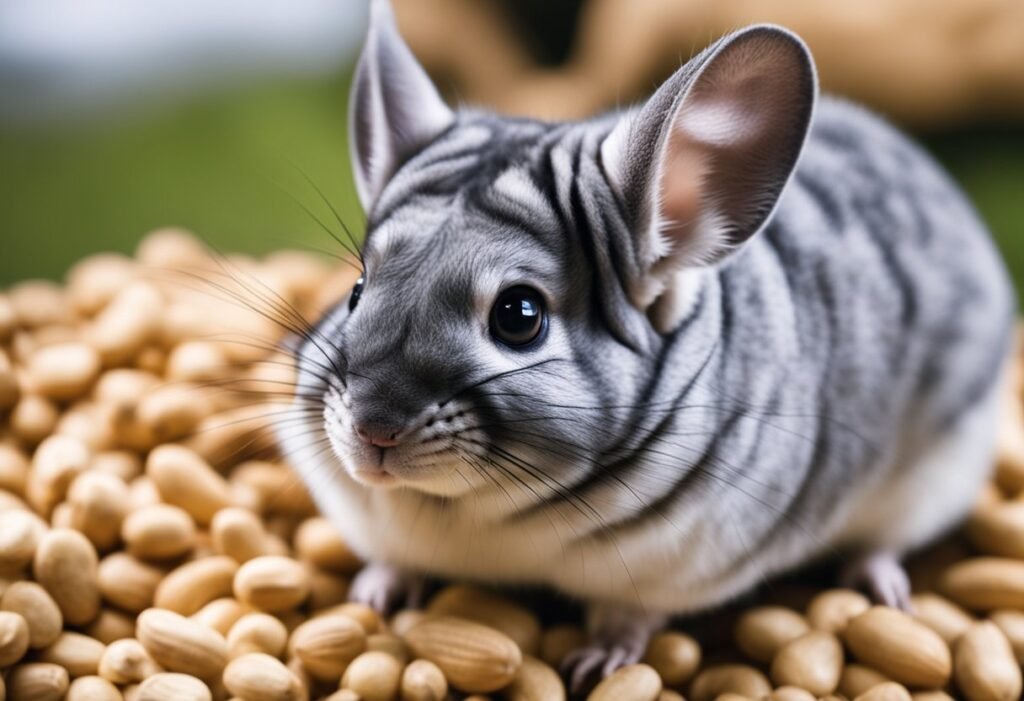
In conclusion, chinchillas can eat peanuts but it is not recommended to make it a regular part of their diet. Peanuts are high in fat and can cause digestive problems for chinchillas if given in excess.
It is important to remember that chinchillas are herbivores and their diet should consist mainly of hay and pellets. Fresh vegetables and fruits can also be given in moderation.
If you do decide to give your chinchilla peanuts as a treat, make sure they are unsalted and unflavored. Also, be sure to remove any shells or skins as they can be a choking hazard.
Overall, it is best to stick to a balanced and healthy diet for your chinchilla to ensure their well-being and longevity.
Frequently Asked Questions
What vegetables are safe for chinchillas to eat?
Chinchillas can eat a variety of vegetables, but it is important to avoid feeding them vegetables that are high in sugar or have high water content. Some safe options include celery, kale, and carrots. However, vegetables should only be given to chinchillas in small amounts and should not make up the majority of their diet.
What fruits can chinchillas safely consume?
Chinchillas can eat small amounts of fruit as a treat, but it is important to avoid giving them fruit that is high in sugar or has high water content. Some safe options include apples, bananas, and berries. However, fruit should only be given to chinchillas in small amounts and should not make up the majority of their diet.
What treats are appropriate for chinchillas?
Chinchillas can have treats in moderation, but it is important to avoid giving them treats that are high in sugar or fat. Some safe options include small pieces of hay cubes, dried herbs, and plain shredded wheat. Treats should only be given to chinchillas in small amounts and should not make up the majority of their diet.
What foods should chinchillas avoid?
Chinchillas should avoid foods that are high in sugar or fat, as well as foods that are toxic to them. Some foods to avoid include chocolate, avocado, and garlic. Additionally, chinchillas should not be fed any processed or sugary foods, as these can be harmful to their digestive system.
Are nuts safe for chinchillas to eat?
Nuts are not recommended for chinchillas, as they are high in fat and can be difficult for chinchillas to digest. Additionally, some nuts, such as almonds, can be toxic to chinchillas. It is best to avoid feeding chinchillas nuts altogether.
Can chinchillas consume corn?
Corn is not recommended for chinchillas, as it is high in sugar and can be difficult for them to digest. Additionally, corn can cause digestive issues and should be avoided. It is best to stick to feeding chinchillas hay, pellets, and small amounts of fruits and vegetables.

